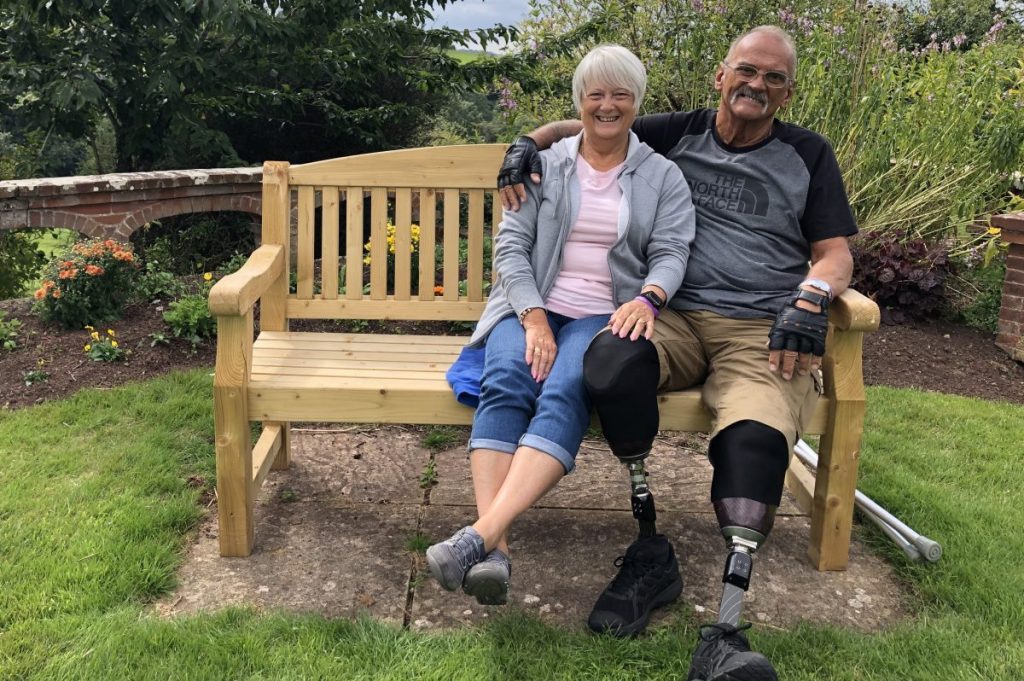To be in the company of Richard and Sue Baldwin is to be in the presence of what they call, a united front. Married for over 40 years, the former Royal Berkshire firefighter and his wife are a team. They laugh together, love together, and unfortunately over the last few years, they have suffered together as well.
Having joined the fire service in 1968, Richard spent 20 happy years in a job he loved: “The camaraderie, the team, the spirit, the ability to challenge yourself, I loved it all,” he says. “You’d be in situations where most people are running one way and you’re running the other. There was a lot of job satisfaction, making someone’s life a bit easier when they’re in a spot of trouble. That’s the biggest thing: knowing you make a difference.”
His career was not without incident, and having fallen through a roof during a house fire in 1972, he badly broke his ankle. Returning to duties, he would go on to break it a few more times during his service, and thought nothing of it. But then he started to notice problems in his hands, finding himself unable to grip things and noticing they were swelling. After operations failed to fix things, he had to leave the fire and rescue service in 1990.
“As a firefighter, you’d be in situations where most people are running one way and you’re running the other. That’s the biggest thing: knowing you make a difference”
Richard Baldwin
“The brigade treated me fantastically well and gave me a full, enhanced pension, which made life a bit easier. I could have stayed in and worked in fire prevention, but I’d been an operational firefighter my whole career, and didn’t want to sit behind a desk. So I left. I hated coming out of the job and it caused me dreadful distress, still does; I’ve never been back on a fire station since because it’s just too painful. I still miss it, nearly 30 years later. I’m 71 in November, but I would go back in tomorrow if I could.”
Richard’s health started to deteriorate, and things reached a head in 1992 when he was hospitalised and put into an induced coma to try and prevent infections in his chest from spreading. It was then doctors discovered he had common variable immune deficiency (CViD), an incurable disorder that impairs the body’s immune system and its ability to fight disease, a condition he has actually had since birth. It was this that had affected his hands and general health, causing him to have six visits to the Intensive Treatment Unit in eleven years. And was also continuing to do damage to his old ankle injury.
“He had ten operations in 11 years on that one ankle to try and pin and place it, but CViD had attacked it and they couldn’t save it,” says Sue. “The bone just kept crumbling around what they were putting on it and his pain levels were getting worse, so in 2013 they said the only thing was to amputate. And it’s a good job they did, because it turned out there were gangrene cells in there, and with no immune system to fight it, he wouldn’t have survived it.”
Having visited Marine Court for recuperation during his illnesses, Richard observed the work going on in the then-newly-opened Rehab wing. Thinking he would like to get fit again after his amputation and adjust to life with his prosthetic, he applied for physical support. Within a few weeks, was attending a two-week course at Harcombe House, just up the road from their home in Devon.
“The help I received from Fire Fighters Charity was utterly vital to me.”
Richard Baldwin
“They were absolutely amazing, they got me moving and gave me my motivation back. I was sinking quite badly at that point, but I’d get into the gym and I was challenging people with two legs, saying come on then, beat me. They gave me the confidence, to know I could do it, even with one leg.”
Richard went on to make several return visits to Harcombe House, and went on to seek psychological support with counsellors. He began to open up about a painful and traumatic incident that had occurred in hospital, which was still causing him flashbacks and nightmares, as well as revisiting incidents he had experienced during his career and childhood.
“The help I received was utterly vital to me,” he says. “Without it, I don’t think my marriage would have succeeded. We were having problems, down to me, my mood swings and ignorance. I tried not to, tried hard, but something takes over.”
But it was a chance encounter during one his visits to the centre – this time with Sue, who had started coming to help him with his mobility – where Richard had a profound experience.
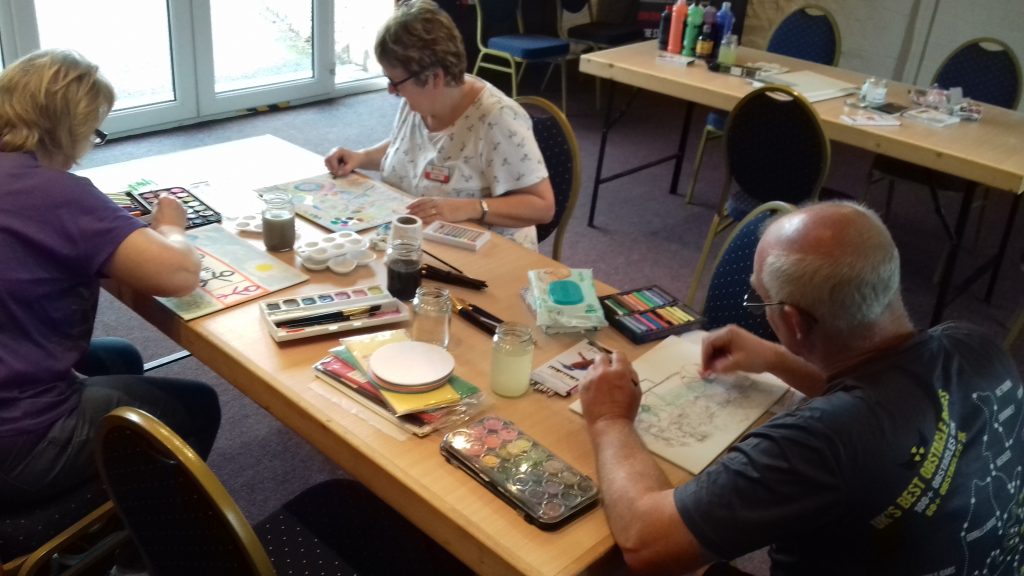
An arts therapy trial was being introduced at Harcombe by Art Psychotherapist Daisy Rubinstein, where beneficiaries were invited to express whatever they were thinking or feeling, and Sue and Richard decided to take part. Inadvertently, Richard found himself drawing the scene of an event from his childhood that he had never told anyone.
“I was sat next to Richard, just doodling really, when I could feel a physical change in him, which made me look across at what he was drawing,” says Sue. “It was quite clear, even though I wasn’t aware of what had happened at that point, that it had sparked something for Richard and he wanted to put it down on paper.”
“Daisy asked if I’d like to talk, and I did and I just found myself opening up,” he says. “She was only the second person I’d ever told. That’s the thing about firefighters, you see and do things and you think you’ve buried it. But you don’t bury it. Your discipline and training carries you through at the time, but you don’t realise what’s going to happen to you when you get old, and I’m just realising that now. How much sparks a hell of a lot of other stuff, even right back to your childhood.”
Richard became a regular face at Harcombe House, and when his illness led to his second leg being amputated last year, he once more sought support from the charity with his recovery, as well as to help him after a Leukaemia diagnosis two years ago. But he says he felt guilty at how much he was being given, concerned it was taking away from someone else. So much so, that when his occupational therapist suggested he could benefit from help of the Welfare team to make life easier at home, he refused.
“You do feel helpless, when he’s got that big, old, black dog weighing down on his shoulders.”
Sue Baldwin
“I said I didn’t want to ask for anymore, because they’re not a rich charity and I already had so much from them,” he says. “But after my second amputation, it became very difficult to get around our house. We paid for a beautiful wet room to be installed, and the local authority were brilliant, widening doors and raising our back patio to make it easier for me. But getting up and down stairs was really tough.”
“It’s so difficult to watch someone you love struggling,” says Sue, who retired early from her career as a legal secretary to care for Richard. “His upper body strength is good, but all his other conditions would make him so tired. He’d go upstairs on his bottom and then more often than not he’d just fall to the bottom while trying to get down. I’d have to stand behind him to make sure he didn’t slip.”
The occupational therapist suggested they ask the charity for a contribution towards the £4,700 stair lift. Having already known Welfare Caseworker Jeanne D’Amario from his visits to Marine Court and time volunteering as a Welfare Volunteer, Richard agreed.
“I’ll never forget what she said when she got in contact,” says Richard. “She said the charity would not be making a contribution to it. They would be paying for the whole thing. And they did. They put a stair lift in within few weeks, and it’s life-changing. I don’t have the worry of going up and down stairs anymore, I can just go upstairs to my little office and be surrounded by my memories, without the worry of getting back down.”
“Jeanne said the charity would not be making a contribution to my stair lift. They would be paying for the whole thing. And they did.”
Richard Baldwin
The thought of being less-abled was never one that Richard ever considered during his time as a firefighter, and he is still adjusting to life after his second amputation. But it has made him think about the labels we put on people: “I don’t like the word disability and you see it everywhere. So I’ve invented a new word: diff-abled. I’m just differently abled to some people. I have a diff-ability, not a disability. I’ve struggled to adapt mentally to how I am now. Sometimes the thought goes through your head, lying in bed at night, and you think, I could go to sleep and hope I don’t wake up. Then you wake up the next morning and think you silly old thing, why think like that? I’d sooner be talking people out of doing it than contemplating it myself.”
Through all of his physical and mental struggles, Sue has been at Richard’s side. And she admits the last few years and his most recent illness have taken their toll on her: “You do feel helpless, when he’s got that big, old, black dog weighing down on his shoulders. It’s not easy, being with somebody who has always been so capable and done everything for themselves to suddenly be so helpless. It’s very difficult to watch, and I think I’m only beginning to realise just how much it has taken out of me. I don’t like to discuss things that concern Richard without him being there, because it doesn’t feel right. But I feel like it’s different at the charity; they understand firefighters, so they understand where I am coming from without me having to go into details.”
“We’re very much a team, and it’s hard but we get there,” says Richard. “Our eyes first met across the room of a party over 40 years ago, and I’ve never been alone since.
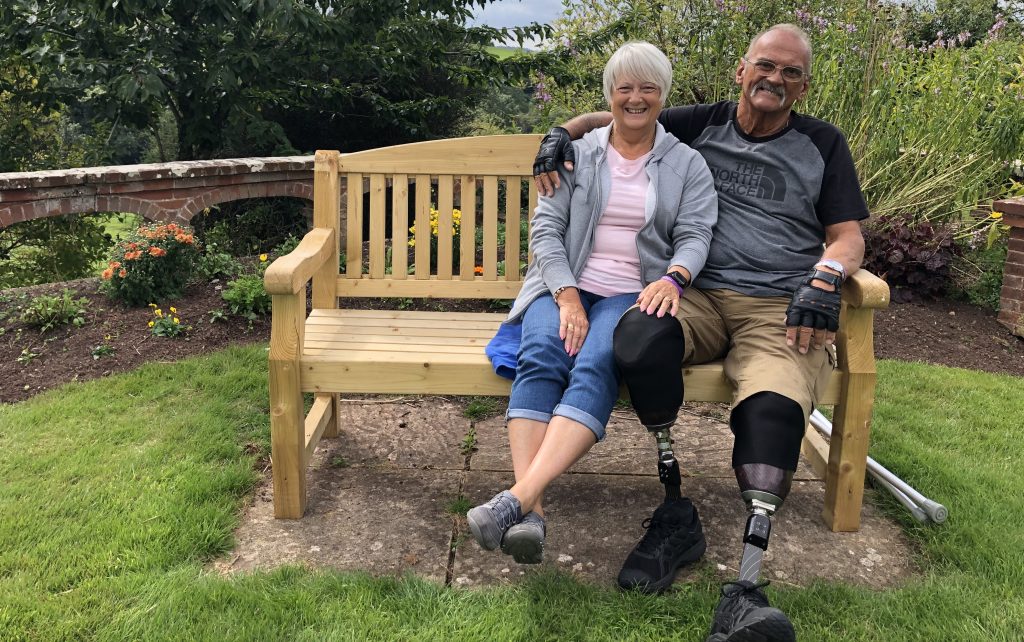
“If anyone had said to me, 30 years ago, I’d end up with issues of depression or self-worthlessness, I have told them to get out. Especially in the fire service where people make a joke of things, using black humour over a pint in the bar to try and get over it. But the only way to get over it is to talk about your feelings, to let people know how you feel and have the ability to say, in the face of all the mickey-taking, look, let’s talk about this. I’ve realised that by being here at Harcombe: they’ve saved my life, just as much as if they’d run in and dragged me out of a house fire.”
One thing Richard and Sue also have in common is how special a place Harcombe House has in both their hearts. From the serenity of the grounds and their specially-adapted bedroom to the compassion of the staff and the companionship of fellow beneficiaries, every time they stay, they feel a little better.
And while hospital visits still hang over their heads, Richard and Sue continue to adjust, whatever life throws at them. They’ve taken up archery together, Richard is preparing to join a wheelchair football team (where electric wheelchairs have fenders round them to chase a giant ball around a pitch) and he is hoping to be able to walk far enough again to once more take up his voluntary duties for the charity.
But it was their most recent visit to Harcombe House that they both agree was one of the highlights of their lives. And this was because they met and spoke with HRH The Duke of Cambridge, who visited the centre on Emergency Services Day in September to talk to beneficiaries whose lives have been changed for the better by their time with the charity.
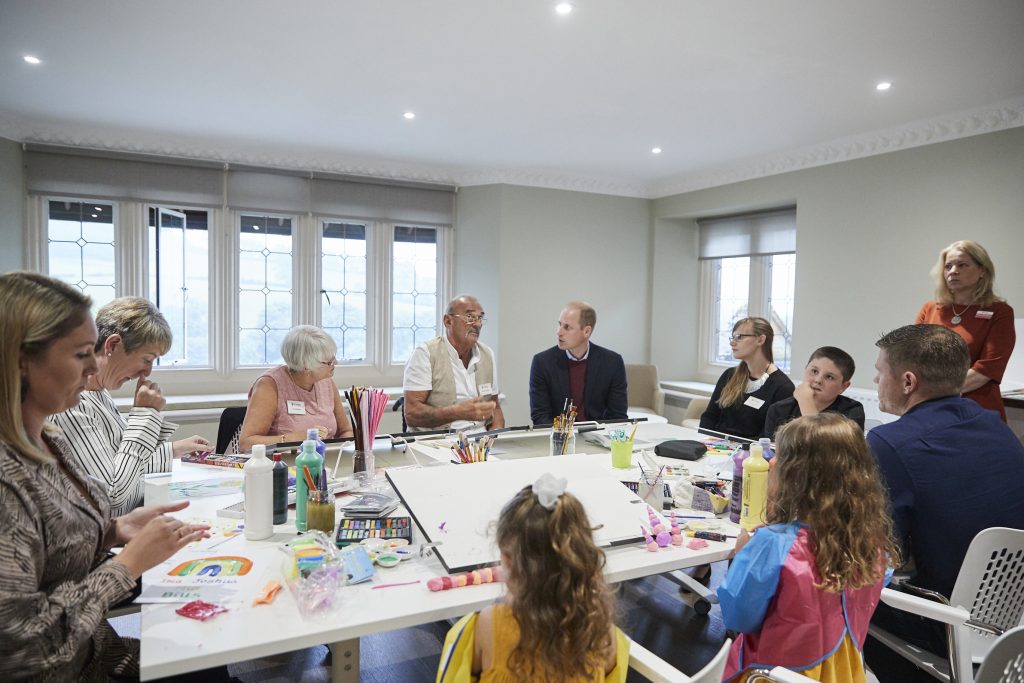
“Being able to speak with him and to share my story with him meant so much to me,” says Richard. “It meant I’m on the way up, and it was tremendous. I could talk to him. A few years ago, I couldn’t talk to anyone. But then I come here and I talk to strangers, and then next thing I know I’m talking to the future king of England. I still can’t get over it!”
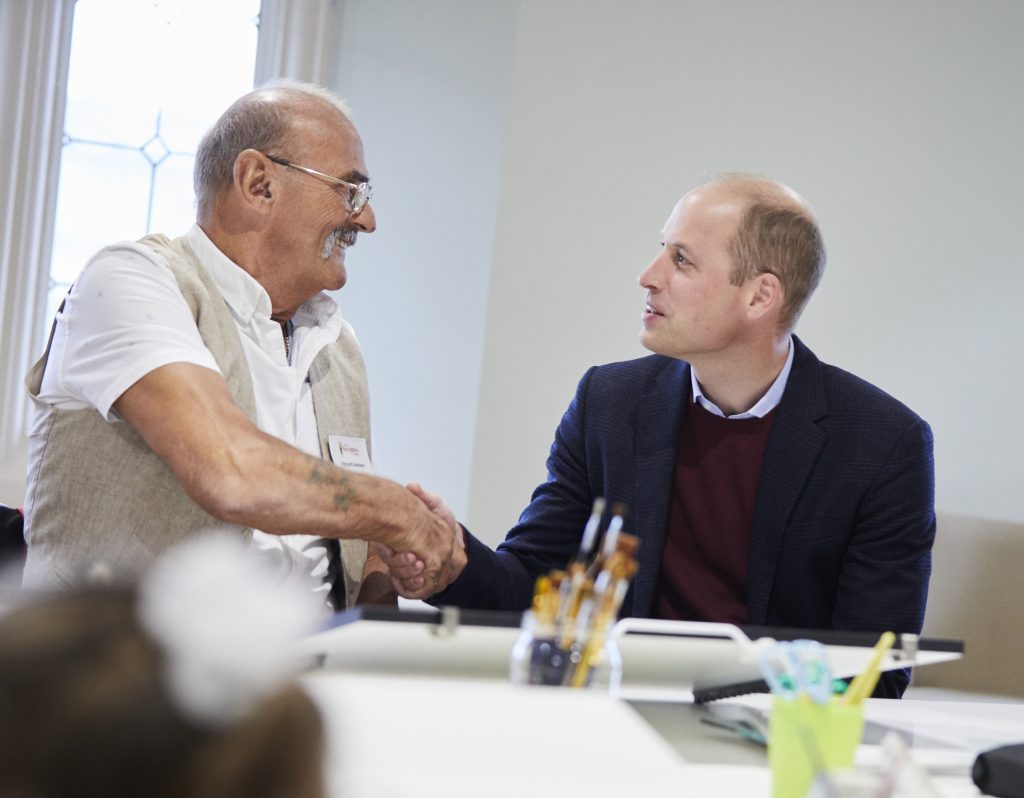
If you’re struggling with a life-changing diagnosis, or you’re the carer of someone who is, get in touch and let us see if we can help. Contact our Support Line today on 0800 839 8820 or apply for support online.

